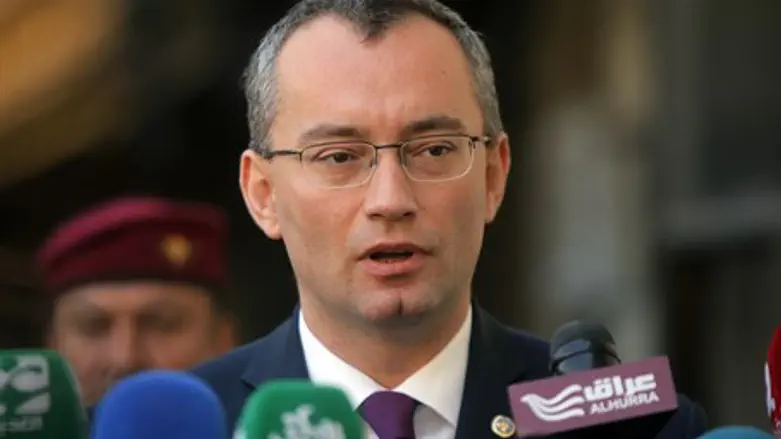
The UN’s Mideast envoy, Nikolay Mladenov, warned Tuesday that clashes between Israelis and Palestinian Arabs in and around Jerusalem’s holy sites have the potential to ignite violence well beyond the walls of its old city, The Associated Press (AP) reported.
Mladenov urged all parties to refrain from “provocative actions and rhetoric” and called on political, community and religious leaders to ensure that visitors and worshippers “demonstrate restraint and respect for the sanctity of the area.”
He also pointed to “a vicious tide of terror and extremism” in the region, according to AP.
Speaking to the UN Security Council by video link, Mladenov claimed that the clashes followed “sweeping restrictions” that Israel imposed on entry to the Al-Aqsa mosque compound on August 26. Since then, he said, Israel has banned members of Muslim and Jewish groups considered to be extremist.
“These latest incidents have echoed widely and have been condemned across the Muslim world and beyond,” Mladenov said.
“It is imperative that the historic status quo is preserved” in line with agreements between Israel and Jordan’s King Abdullah II, who is custodian of the Muslim holy sites in Jerusalem, he added, according to AP.
Mladenov noted that Prime Minister Binyamin Netanyahu has said his government “will use all means to maintain the status quo and law and order on the compound.”
Against this backdrop, Mladenov said, “frustration, fear and violence have continued to spiral, undermining belief in finding a way out of the impasse.”
He called for “bold, concrete actions” on the ground, in the region and internationally to reach a two-state solution.
This must include “significant policy shifts by Israel” and “an unflinching commitment on the Palestinian side to achieving genuine national unity,” he added, according to AP.
On Sunday, hours before Rosh Hashanah, masked Muslim rioters hurled rocks and fireworks at police on the Temple Mount, as well as firebombs near two entrances to the site.
Jerusalem District Police and Border Police were forced to respond with riot dispersal measures. No injuries were reported during the clashes, but the clashes invoked condemnations of Israel from Palestinian Authority (PA) chairman Mahmoud Abbas, Jordan and the Arab League.
The clashes continued on Tuesday, as once again masked Muslim youths gathered around the mosque and threw rocks and other projectiles at police who had entered the compound in large numbers and responded with stun grenades.
The Temple Mount, on which the Al-Aqsa Mosque stands, is the holiest site in Judaism. Arabs have repeatedly tried to erase the Jewish nature of the site, where the First and Second Temples stood, by destroying ancient Jewish artifacts and building illegally.
Mladenov said on Tuesday that the Quartet of Mideast mediators — the UN, U.S., European Union and Russia — and key Arab nations will meet September 30 on the sidelines of the General Assembly’s annual ministerial meeting to discuss how to link regional and international efforts to create conditions for a return to “meaningful negotiations.”
Riyad Mansour, the Palestinian UN ambassador, was quoted by AP as having told reporters the Palestinians want a time frame for talks and ending Israel’s “occupation”.
He ruled out the previous practice of U.S.-brokered negotiations with Israel, saying a larger group will have “better atmosphere for increasing the chance for success.” He pointed to the six-party talks that led to the Iran nuclear deal and the collective process that has tried, so far unsuccessfully, to get the government and rebels in Syria to peace negotiations in Geneva as examples.
Mansour called the situation at the holy sites in Jerusalem “extremely dangerous,” accusing “Israeli extremists” of trying to have a Jewish presence at the Al-Aqsa mosque.
He warned that Israeli actions could trigger religious confrontation over the holy sites, adding that this would be the dream of the Islamic State extremist group and would have “ramifications that will affect all corners of the Middle East and beyond.”